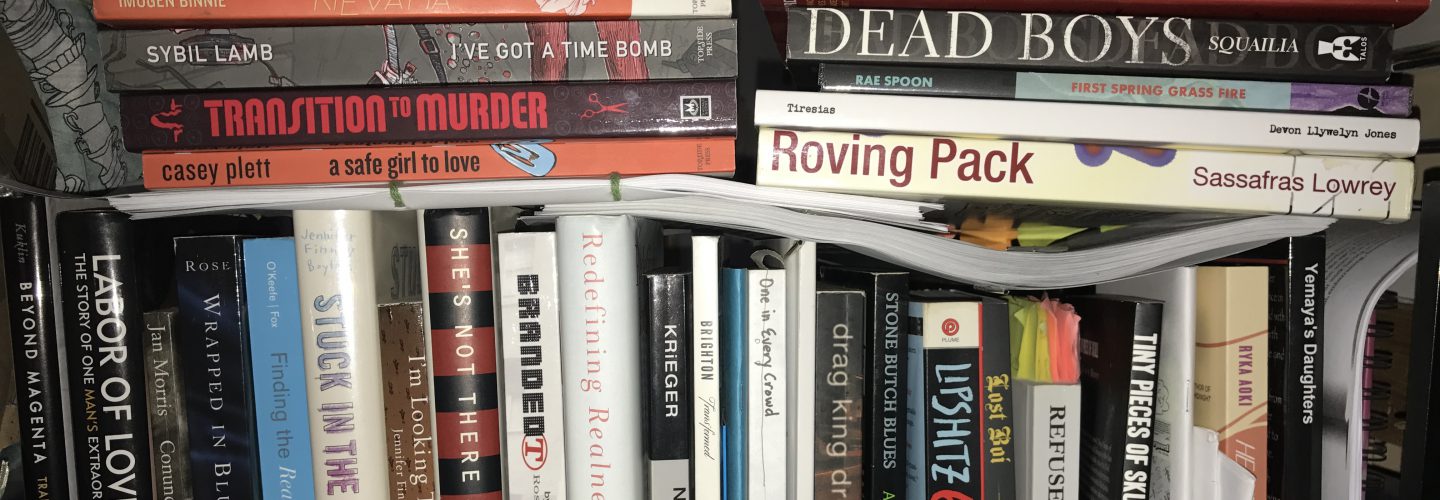[Today’s post edited to reflect the reveal of Caitlyn Jenner’s chosen name and pronouns]
I mentioned a couple of posts ago that rather than doing any actual work I was writing a conference abstract instead. It turns out that it was a really good use of time because it was accepted! I’ll be presenting at the Trans Studies Now conference on the 12th June down in Brighton. So now I just have to actually write the paper.
The paper is on the theme of passing in post-90s trans-authored literature. I’ll also be using Chimamanda Ngozi Adichie’s TED talk on The Danger of a Single Story in which she suggests that oftentimes any existence outside of the Western, white, middle-class, cisgender male is narrowed down to a single narrative. This dominant portrayal of a single aspect of a certain group’s identity leads to the dehumanisation of that group. She states that if you ‘show a people as one thing, as only one thing, over and over again […] that is what they become’ (Adichie, 2009). In the case of trans individuals, they become the story of transition. As has been seen with the coverage of Caitlyn (née Bruce) Jenner in the media, in the Katie Couric interview of Carmen Carrera, in Louis Theroux’s Transgender Kids documentary and numerous other examples, the main concern is always transition, always to do with physical change, always to do with an adherence to binary gender.
Rumours of Jenner’s transition have been appearing in the media for months, there has been a deluge of discussion on physical changes and sartorial choices. The In Touch Weekly magazine cover that photoshopped make-up onto a picture of Jenner was particularly reviled by trans activists (and anyone with a shred of decency) as being transphobic and highly inappropriate. Trans activist and pioneer Kate Bornstein said in response ‘DAMN IT. BRUCE JENNER IS BEING BULLIED, AND PUBLICLY SHAMED FOR NO OTHER REASON THAN BEING TRANS‘ (2015). This cover not only highlighted the inherent transphobia of a media that believes that being trans is shameful, something that should be exposed, but also foregrounded the obsession with transition even, in this case, when transition hadn’t [yet] been declared.
As Chimamanda Ngozi Adichie suggests, ‘It is impossible to talk about the single story without talking about power […] How they are told, who tells them, when they’re told, how many stories are told, are really dependent on power‘ (2009). In this case, the trans story is being told by the cisgender patriarchy.
‘Power is the ability not just to tell the story of another person, but to make it the definitive story of that person‘ (Adichie, 2009)
It is due to the prominence of this single story narrative that I chose to focus my thesis on trans-authored texts. Trans theory is based in lived experience, embodiment and in the acceptance of a huge range of gender identities, all of which are elements of trans that the dominant narrative ignores. What if Caitlyn Jenner, rather than transitioning, was simply exploring a new element of her expression of self? Why is it that society is so concerned with transition? Perhaps it’s because whilst trans unsettles identity categories previously considered to be unquestionable the notion of transition still somewhat upholds the gender binary. This is something I found during my MA when I looked at both trans- and cis-authored texts. The cis-authored narratives were far more rooted in a strict transition from one gender to the other, whereas trans-authored texts tended to embrace more flexible, liminal gender identities – as famously seen in Leslie Feinberg’s Stone Butch Blues in the character of Jess who transitions from female to male before embracing a non-binary identity.
There’s a huge potential for academic work in the comparison of trans- and cis-authored texts but ultimately until trans-authored texts have been discussed on their own merit, until those non-dominant narratives have been explored, until the single story has been transcended and multiple experience has been accepted by culture at large, that comparison has the potential of focusing on how trans people ‘differ’ to dominant cis narratives, rather than foregrounding the diversity of trans experience and the failure of cis-normative culture to understand a range of identities previously ignored.
This started as a blog post at 5:30 in the morning, but now I think it might make its way into the actual paper. This is something I’ve found really useful about writing the blog, not only does it help motivate me and give me some sense of accountability, but it also helps me articulate my thoughts. I usually get really bogged down with trying to get my academic writing perfect and this causes no end of writer’s blog and panic-induced procrastination, but allowing myself a non-formal space to quickly chuck ideas at seems to break through the block and gives me a sense of achievement from which to springboard into my actual writing.
Last week while I was still at Mum’s I read another two and two half books (I got half way through one and realised it wasn’t relevant, the other is in my handbag waiting to be finished). This week will be focussed on writing this paper before heading back down south to Brighton via Gloucestershire and Exeter.

Glad to see you’re on track.
LikeLiked by 1 person
Thanks, hopefully anyway!
LikeLike